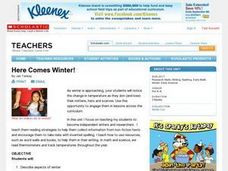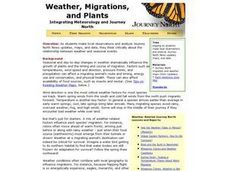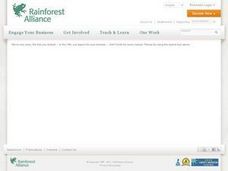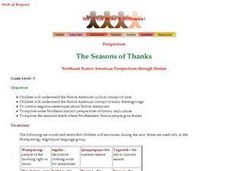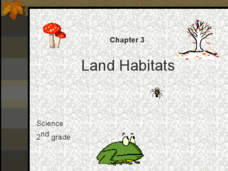Curated OER
Ecology: Factors Influencing Animal Populations
Students assess the factors affecting animal populations. Working in groups they define specific vocabulary terms and complete several activities from "Project Wild."
Curated OER
Global Climates and Seasons
Students look at the differences that exist in all four seasons. The resources of animation are available to be used to illustrate scientific concepts in a media that is engaging to students.
Curated OER
Birds on the Move
Students observe the migrational path of the Swainson's Hawk from northern Minnesota to the southern portion of South America. They study the migratory path of the hawk and observe how the vegetation in a particular region of the earth...
Curated OER
Heading South
Students look at the migration of different birds. In this migration lesson, students discuss why an animal migrates and problems that can occur during migration. They look at several downloadable maps that show the specific routes of...
Curated OER
Here Comes Winter!
Students investigate winter behaviors in animals. They describe winter and write about the characteristics of the season by drawing and labeling a winter picture. Students then conduct research on a chosen animal and create a chart. ...
National Wildlife Federation
Why All The Wiggling on the Way Up?
Some of the CO2 emitted by burning fossil fuels is removed from the atmosphere by natural sinks, such as the ocean. The fifth engaging lesson in the series of 21 examines the CO2 data from three very different locations. It then makes a...
Howard Hughes Medical Institute
Population Dynamics
Will human population growth always be exponential, or will we find a limiting factor we can't avoid? Young scientists learn about both exponential and logistic growth models in various animal populations. They use case studies to...
Curated OER
Fable of the Fainting Goat
Second graders explore animal life by reading children stories in class. In this goat fable lesson, 2nd graders read several books which describe the different myths and folklore about goats. Students identify the needs of living animals...
Curated OER
Sun Path: Interactive On-line Mac or PC
Students use SunPath in the yearly mode to investigate seasonal changes in sunrise, sunset, length of day and sun altitude at their own latitude. Sun Path JAVA applet uses equations for a spherical Earth to calculate the sunrise and...
Curated OER
Baa, Ram, Ewe.... Sheep Tales
Pupils explore animal characteristics by reading animal stories in class. In this sheep habitat lesson, students identify the uses for sheep in our agricultural based society and the importance of wool in our economy. Pupils read several...
National Shooting Sports Foundation, Inc.
How Many “Un-endangered Species” Do You Know?
Can endangered species become un-endangered? Of course! Examine six lucky animals whose populations once were dwindling, but now are healthy and thriving. Learners match animal images to brief descriptions, complete a true/false...
Curated OER
Natural Inquirer
Students interview wildlife experts to gain information needed to research and write a report about an aquatic plant or animal affected by climate change.
Curated OER
Weather, Migrations, and Plants
Students research the effects of day-to-day weather on animal migrations, plant growth and other seasonal events. They consult maps, observe and record local conditions, keep journals and use their collected data check hypotheses.
Curated OER
Changing How Things Look
Third graders use a literature study in order to investigate how organisms effect an ecosystem. They are asked questions about change taken from the book. Students also take a nature walk to make field observations.
Curated OER
Color Your World with Changes --- the Camouflage Game
Seventh graders, after predicting dominant colors foud in their habitat or garden, visit heir area on a monthly basis. They search for colored toothpicks, then graph the results, determining the dominant color for the month.
Curated OER
Birds and Coffee
Fifth graders identify the changing seasons with how they affect animal and human behavior. They explain what migration is and why many birds migrate south for the winter. They then trace the coffee sold in their neighborhood and in...
Curated OER
Heading South
Learners study the concept of animal migration with the change of seasons. They discover that migration can be hazardous, and the distance migrated can be short or long.
Curated OER
How Is A Frog Able To Swim In The Trees?
Fourth graders explore the interdependence of frogs and trees. They discuss the various things they need everyday to survive. Students select an animal from their local bioregion and research things that animal is dependent upon for...
Curated OER
The Earth in Space
Students use computer images to explain why the Earth has seasons and examine the phases of the moon. They create 3-D images and present them to the class. They answer a series of questions at the end of the lesson.
Curated OER
Chain Reaction
Learners study animal behavior and how it changes to its environment. In this animal lesson students design and conduct experiments.
Curated OER
The Seasons of Thanks
First graders explain the Native American cyclical concept of time
Curated OER
Land Habitats: Grade 3 Science
Build your students scientific vocabulary with this slide show on land habitats. Each slide provides a vocabulary word, image, and definition of a term common to habitats and the environment. Great for science class or as comprehensible...
Curated OER
Hickory Dickory Dock: The Biological Clock
Students investigate the effect of day length on animal migrations. They view a Powerpoint presentation, identify their own personal migrations and cues, answer discussion questions, and test a hypothesis about seasons.
Curated OER
Penguins Nesting Know-How
Students maintain a field journal as they follow penguin parents raising their chicks during the breeding season. They formulate testable questions. Students reflect on animal behavior in the field related to survival and chick rearing.






